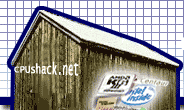


 |
 |
 |
| home | about | pictures | reference | trade | links |
|
||||||||||||||||||||||||||||||||||||||||||||||||||||||
| Bus Speed | Multiplier | CPU Speed |
| 100MHz | 16 | 1600MHz |
| 133MHz | 12 | 1600MHz |
| 166MHz | 10 | 1666MHz |
| 200MHz | 8 | 1600MHz |
|
Common clock speeds of an Athlon
1600 |
||
Here you can see that the overall CPU speed has remained almost unchanged
while the bus speed as increased dramatically. Even though the CPU
is at the same speed the computer will be MUCH faster with a 200MHz
bus then with a 100MHz bus. This is because the bus is what carriers
the data to and from the CPU, the faster you make the bus the less
of a bottleneck it becomes. The CPU no longer has to wait as long
for the next instruction.
Of course the goal is not just to increase bus speed but to increase overall CPU speed as well. How is this possible? When companies are making CPUs they test them at certain speeds. Say they are making a batch of P4s for a 3.0GHz bin, they will test them all at 3.0GHz and if they pass they will be sold as 3.0GHz CPUs. Now it is entirely likely that these Pentium 4's can go faster then 3GHz. Intel may test the next batch at 3.4GHz and sell them at that. Generally the goal is to sell the CPUs for the highest speed that they run well at (as this makes the most $$), but it is inevitable that lower speed grades will be filled with chips that will go faster. One of the most famous examples of this was the Intel Celeron 300A. Almost all of these chips would do 450MHz with very little extra work.
Ahh there we go, extra work, yes it is usually the case that you will have to do SOME work to get your CPU to run faster. The most common things are: better cooling, and more voltage. Better cooling is obvious, if you run the chip faster, it gets hotter and you need to get rid of that heat. More voltage goes right along with that. If you are going faster, more power is being consumed (mainly through what's known as leakage current) and thus the voltage sags, meaning you need to supply it with a bit more then usual.
Just like hopping up your '69 Mustang you will need some equipment
if you want to get anymore then a few extra MHz.
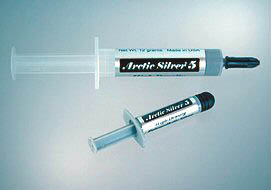 |
Thermal grease is what makes the connection between the CPU itself and the big heatsink on top of it. The stock TIM (Thermal Interface Material) is pretty lousy so most people use something like Arctic Silver. This can lower temperatures by 4C or more. |
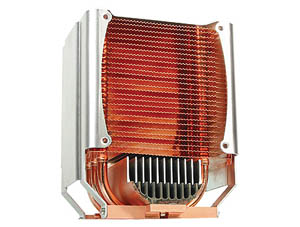 |
To deal with that increased heat you will need a bigger heatsink and a bigger fans. CPUs these days generate A LOT of heat even at stock speeds, so real good heat sinks have become large, expensive, and loud. |
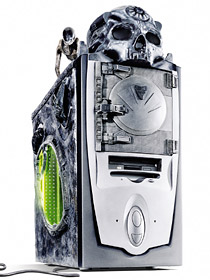 |
Getting the heat off the CPU is not enough, it must be removed from the case. Many people mod their cases with blow holes and bigger fans. Many companies now sell cases with these additions built in. This is great if you are not handy with a Dremel and Saw'z'all. These cases tend also to have lighting, fancy paint and other cool features, much like a hot rod car. |
 |
Just like cars there is a supercharger for those truly obsessed with speed. In computers this takes the shape of water cooling. This generally uses pumps, water blocks, and radiators to remove the heat from your CPU quickly and dump it outside the case. One of the best things about water cooling is that it is much quieter then high-end air. |
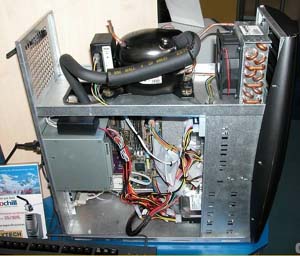 |
Yes there is Nitrous in the world of Overclocking. Several companies now offer cases with refrigeration systems built in. These require close monitoring to make sure liquid condensation does not form on the electronics inside your case! |
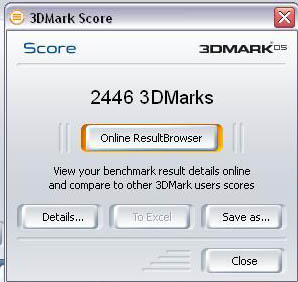 |
To test your Mustang you take it to the Dyno. To test your PC you benchmark it. This gives you a 'number' to compare with others and brag with. Common benchmarks are 3dMark05, and Doom III frame rates. |
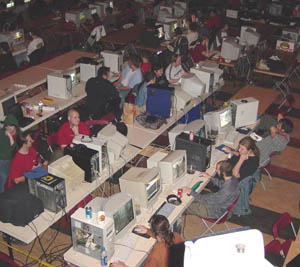 |
To show off you Mustang, you take it to the local track. TO show off your newly overclocked computer you pack it up and go to a LAN Party where dozen, or more computer hotrodders gather to game and share their prow, as well as gloat and drool over others hardware. |
Wow now you got a great fast computer, what next? Well there are many other things you can overclock inside and outside of your computer. Many people overclock their video card; this helps a lot if you game, still other uber-nerds overclock their TI calculators. In theory if it has a CPU in it you may be able to find a way to overclock it. Be aware though, some things are meant to run at ONE speed alone, overclocking them may cause them to not work anymore!
Here are some links that may be of further help to you:
Overclocking Websites |
|
| OC.com has lots of great information and a huge forums where you can ask about anything you wish. | |
| AOA Forums has a file section and great forums to help you out. | |
| Anandtech is a very professional and informative website with lots of great articles and revies of hardware. | |
| PC Perspective is a conglomerate of great sites about PC hardware and tweaking. | |
Overclocking Hardware Vendors |
|
| The Heatsink Factory has great deals on heatsinks, fans, and case modding accessories. | |
| Newegg sells about everything there is to do with computers. Their prices are reasonable and their shipping very fast. They also have a great RMA policy. | |
| Directron caters to the performance PC crowd. They have OC gear, styling additions for your system, high performance peripherials and much more. | |